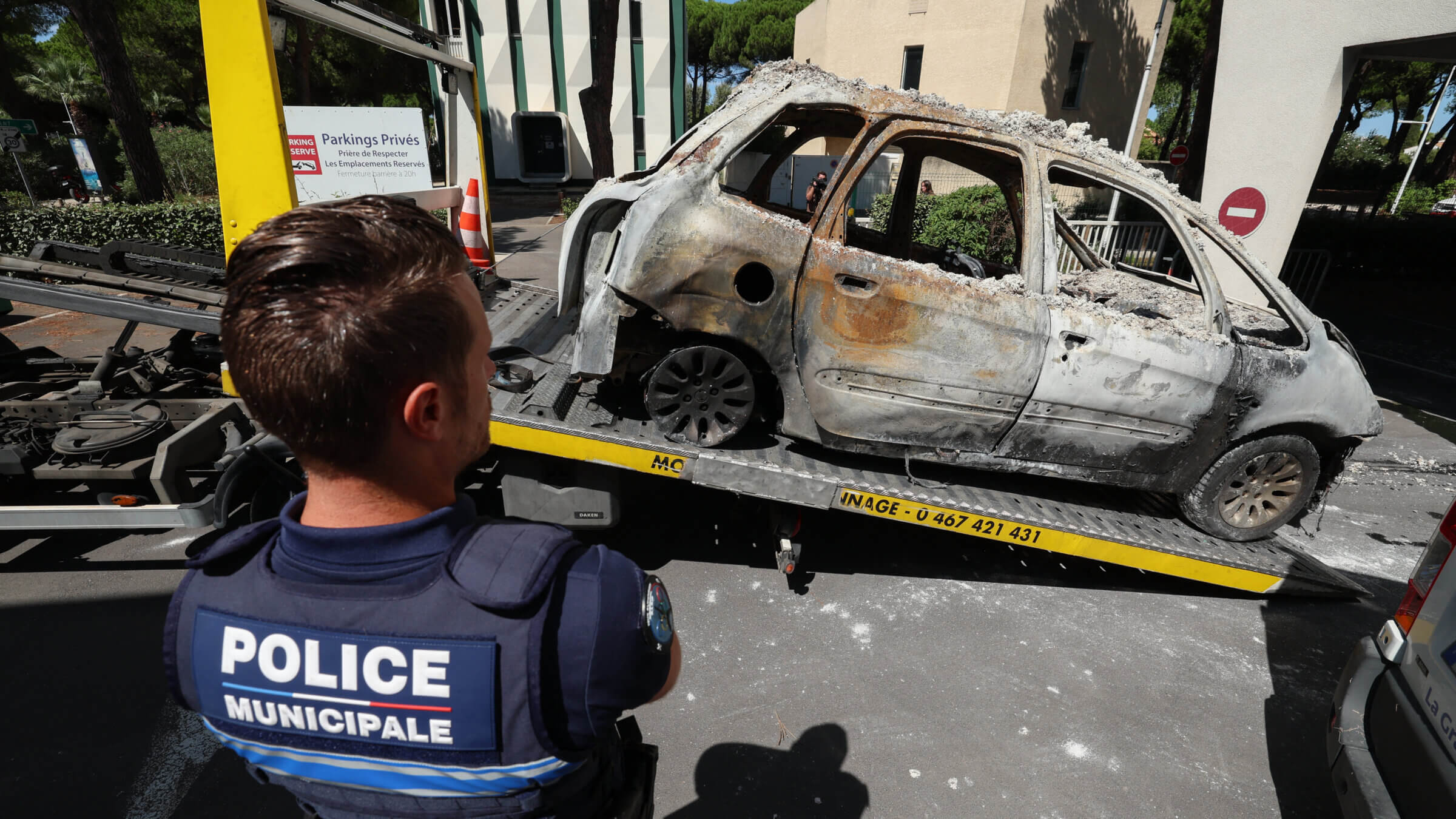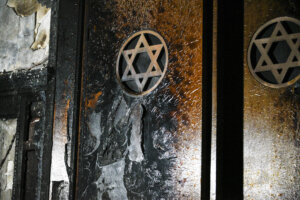For the 900th time, an antisemitic attack is an attack on all of France
For French Jews after a bombing outside a synagogue, it’s ‘plus ça change, plus c’est la même chose’

A police officer stands in front of a burnt car being moved on the bed of a towing vehicle in the seaside resort of La Grande Motte, near the Beth Yaacov synagogue.
In mid-May, the synagogue in the northern French city of Rouen was the site of an attempted attack of arson. The blaze was doused before it could spread, while the armed suspect, a young Algerian national, was shot and killed by the police. The city’s mayor remarked that the attack was aimed not just against the Jewish community, but the entire city. “We are all in shock,” he declared.
This past weekend, that same sentiment was expressed by elected representatives at the southern end of France. On Saturday morning, another young Algerian male exploded a small bomb outside the synagogue in La Grande Motte, a resort and retirement town on the Mediterranean coast. The explosion torched two cars parked just outside the synagogue, but failed to reach the building, where services were scheduled to start in 30 minutes. A few hours later, the acting prime minister Gabriel Attal had arrived at the scene. Surrounded by public officials wearing the tricolored sash of the French Republic, Attal forcefully announced that “an attack on a French Jew is an attack on all French.”
Attal’s point is correct as far as it goes. These and related antisemitic incidents — nearly 900 have occurred since January, which dwarfs the 304 incidents that occurred during the same period in 2023 — are indirectly aimed at the secular values and democratic institutions of republican France. But the prime minister’s point also does not go far enough. While his statements are sincere and strong, they do not suffice for the many French Jews who, like the young Parisian interviewed by a journalist, confessed that when he “goes to the synagogue, it’s with a knot in my stomach.”
But most French do not take these attacks — well, how can we put this? — they do not take them personally. Most French go to church, or for that matter to the butcher and baker, without their stomachs tied in knots.
But stomach-knotting is hardly a recent development for French Jews. The arrest of the suspect in Saturday’s terrorist attack in the city of Nîmes, a short hop from La Grande-Motte, serves as a reminder that Jewish communities in the French provinces are an essential part of the history and fabric of French Judaism. Tellingly, it was in Pissevin, the aptly named quarter on the edge of Nîmes where decaying and dismal high-rise towers jut skywards, that the suspect was discovered by the police who, after wounding him in an exchange of gunfire, arrested and carted him off to a hospital.

Gunfire is not uncommon in Pissevin. This bleak quarter, almost entirely inhabited by immigrants, both legal and illegal, from North Africa, has become a battlefield between rival drug gangs. Almost exactly a year ago, a 14-year-old boy was wounded by a stray bullet; the following day, a 10-year-old was killed by yet another bullet.
Not unlike the changing demographics in American cities during the second half of the 20th century, Pissevin had originally been home to a different group of immigrants. With the end of France’s colonial war in Algeria in 1962, nearly a million French Algerians — known as pied-noirs — left their homes and settled in France, primarily along the Mediterranean coast. Joining this exodus were more than 120,000 Sephardic Jews whose presence in this swathe of North African territory, unlike that of the more recent French colonists, stretched back centuries. They, too, resettled in hastily-built suburbs like the Pissevin quarter of Nîmes, which were less homes to treasure than holding centers to house this tidal wave of humanity.
In the case of Nîmes, there was already a small but important Jewish community of several hundred. The roots of many of these families dug as deeply as the Middle Ages, where their ancestors lived under the protection of the Pope — or, rather, one of the popes — during the period of the Papal Schism. Among the more illustrious members of this community was Bernard Lazare, the anarchist poet who became one of the leading defenders of Alfred Dreyfus, and Adolphe Crémieux, the Minister of Justice who, in 1870, authored the bill that transformed Algerian Jews into French citizens.
Tragically, the Crémieux Law did not also extend citizenship to the Arab and Berber populations of French Algeria. It thus became one of the many factors that eventually led to the Algerian war for independence and the great exodus of pied noirs, including the Sephardic Jewish community, to France. Places like Pissevin were, in effect, way stations. The recently arrived Sephardic Jews remained in these suburbs, which were poorly built and poorly served by public transportation, only until they had the means to move to less isolated and more integrated neighborhoods. Their places were taken by yet another wave of immigrants, mostly Muslim and mostly from the Maghreb region of Africa, drawn by the prospect of a better life.
No less tragically, the promise of such a life never materialized for the offspring of these immigrants. More than 70% of the residents of Pissevin live below the poverty line, a brutal and despairing fact that largely explains why drug gangs and radical Islamist sects flourish here. The motivations of El Hussein K., the suspect in the synagogue attack, seem to be a cross of these two bleak trends. In an interview shortly after the attack, the rector of the mosque in Pissevin declared that the suspect, who often arrived under the influence of drugs, had been expelled from the building two years earlier.
Nevertheless, it appears that the attacks on the Rouen and La Grande-Motte synagogues marks, as a headline in Le Monde announced, “a turning point” in the seemingly inexorable climb of antisemitic acts in France. The aim is no longer to harass or threaten French Jews, the newspaper observed, but instead to “kill them.” As a result, this may well lead to another tragic turning point: yet another exodus for French Jews, this time to Israel.
























